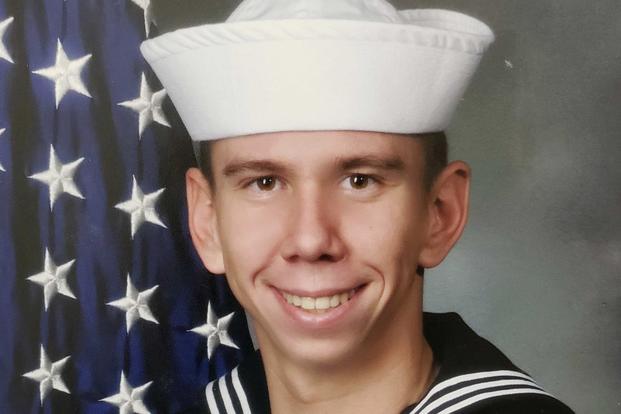A bill that would give service members a way to get mental health treatment without going through their chains of command received a boost Tuesday after being introduced in the Senate by Arizona Republican Martha McSally.
Named for a Navy sailor who died in June 2018 by suicide after he was bullied and harassed by his supervisors, the Brandon Act passed the House last month as an amendment to the fiscal 2021 defense policy bill. Aircrew Aviation Electrician's Mate Striker Brandon Caserta's experience was first reported in an award-winning article on Military.com.
Read Next: VA Facilities Continue to Hide Doctors' Misconduct, Probes Find
The Brandon Act would provide troops a path to confidentially requesting a mental health evaluation and treatment without command notification, similar to an option available to troops for reporting sexual assaults without launching a formal investigation, known as a restricted report.
Under the proposal, service members would be able to use a safe word or term while seeking an evaluation or treatment that would guarantee confidentiality.
McSally, a retired Air Force colonel who disclosed during a Senate hearing last year that she was raped while serving in the military but did not report it, said the Brandon Act is needed to help "break the stigma around mental health."
"Bullying and abuse have no place in our military. The bullying Brandon Caserta experienced in his squadron is heartbreaking, and what's worse is that he was unable to get the mental health treatment he needed," she said.
Caserta, 21, died June 25, 2018, in Norfolk, Virginia, after struggling for nearly two years at Helicopter Sea Combat Squadron 28. Caserta initially joined the service to become a Navy SEAL, but was forced to drop out after breaking his leg during Basic Underwater Demolition/SEAL School.
He was unhappy in his assigned rating and also served under a lead petty officer who frequently abused, cursed and mocked sailors under his command. Caserta also was harassed by command leadership for not producing a driver's license and spent months at a time assigned to sell snacks at the unit canteen.
When he broke a collarbone and was sidelined at work -- an event that reset the progress he'd made on earning his professional qualifications for his ratings from 72% to zero -- Caserta told his parents he was "done," according to his suicide note.
"Everything I worked for was gone in a moment's glance," he wrote.
While Caserta texted and talked frequently with friends and told some that he was struggling, his parents, Patrick and Teri Caserta, said he seemed to have few options for getting medical care, including mental health treatment.
Since his death, they have raised awareness of the impact of "toxic leadership" on junior military personnel and fought for legislation to protect service members and provide them better access to behavioral health.
"The Brandon Act would carry on his legacy by ensuring all service members can ask for help with no risk of retaliation when they are struggling," the Casertas said in a release.
While McSally's introduction of the Brandon Act in the Senate does not guarantee that the bill will become law, it makes it more likely that senators will seriously consider the proposal, given it has passed the House.
The House version was sponsored by Rep. Seth Moulton, D-Mass.
McSally initially attempted to introduce the bill as an amendment to the Senate's version of the National Defense Authorization bill -- a move that would have ensured its passage if President Donald Trump does not veto it -- but Senate leadership accepted very few amendments from members during this year's legislative process.
The Defense Department's Annual Suicide Report for 2018 found the suicide rate among active-duty U.S. service members was 24.8 deaths per 100,000 troops, the highest on record since the DoD began tracking suicides closely in 2001.
The age-adjusted suicide rate in the general population in 2017 was 18.2 deaths per 100,000, according to the DoD.
In 2018, the Army had the highest number of active-duty suicides in 2018, 139, for a rate of 24.9 per 100,000. The Navy experienced 68 deaths, a rate of 20.7 per 100,000, while the Air Force had 60 suicides, a rate of 18.5 per 100,000. The Marine Corps had 58, or 31.4 deaths per 100,000.
According to the report, of the 325 service members who died by suicide that year, more than half -- 53% -- had contact with the military health system in the 90 days before they died, mainly a general appointment (48%) or a mental health visit (30%).
The Casertas said Tuesday that the bill will ensure that "no service member will be left behind."
"The Brandon Act brings us peace of mind that all service members will be able to get the help they need when they need it the most," they said in a statement.
If you or someone you know needs help, the Veterans Crisis Hotline is staffed 24 hours a day, seven days a week, at 800-273-8255, press 1. Services also are available online at www.veteranscrisisline.net or by text, 838255.
-- Patricia Kime can be reached at Patricia.Kime@Monster.com. Follow her on Twitter @patriciakime.
Related: In a First, Pentagon Releases Data on Military Spouse and Child Suicides













